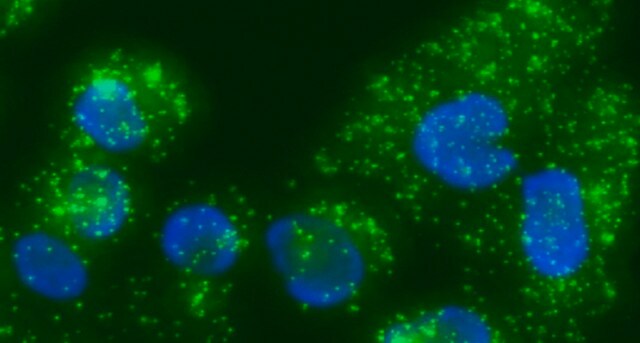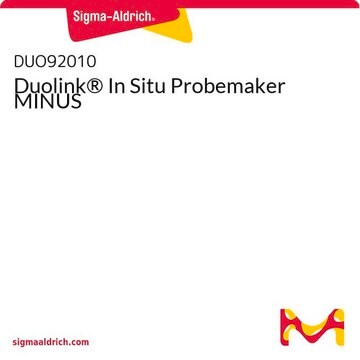DUO94005
Duolink® flowPLA Detection Kit - Violet
Duolink® PLA kit for Flow Cytometry with Violet Detection
Sinonimo/i:
in situ Proximity Ligation Assay, Flowcytometry-PLA, Protein Protein Interaction Kit
About This Item
Prodotti consigliati
Nome Commerciale
Duolink®
tecniche
flow cytometry: suitable
immunofluorescence: suitable
proximity ligation assay: suitable
Fluorescenza
λex 390 nm; λem 476 nm
Compatibilità
suitable for fluorescence
Condizioni di spedizione
dry ice
Temperatura di conservazione
−20°C
Categorie correlate
Applicazioni
Violet Fluorescence Detection Reagents
Use appropriate laser for ?ex 390 nm excitation
Use appropriate filter for ?em 476 nm emission
Application Note
Primary antibodies are needed. Test your primary antibodies (IgG-class, mono- or polyclonal) in a standard immunofluorescence (IF), immunohistochemistry (IHC), or immunocytochemistry (ICC) assay to determine the optimal fixation, blocking, and titer conditions. Flow validated antibodies are recommended.
Let us do the work for you, learn more about our Custom Service Program to accelerate your Duolink® projects
View full Duolink® product list
Duolink® flowPLA Detection Kits will enable sensitive detection of proteins, protein-protein interactions, and protein modifications within cell populations by flow cytometry. To perform a Duolink® flowPLA experiment, you will need fixed, suspended cells, two primary antibodies that specifically recognize your proteins of interest, a pair of PLA probes (one 100RXN PLUS and one 100 RXN MINUS), wash buffer and a Duolink® flowPLA Detection Kit. The flowPLA Kits are available with 5 different fluorophores: Violet, Green, Orange, Red, or FarRed. The flowPLA Kits contain all the necessary reagents to perform the amplification and detection of bound PLA probes by flow cytometry. Analysis is carried out using standard flow cytometry assay equipment. User must provide a fixed cell suspension, primary antibodies, and corresponding PLA Probes.
Follow the Duolink® PLA Flow Cytometry Protocol to use this product.
Visit our Duolink® PLA Flow Cytometry page on how to run a Duolink® flow experiment, applications, troubleshooting, and more.
Caratteristiche e vantaggi
- Analyze protein protein interactions with flow cytometry readout
- Analyze cell populations with Proximity Ligation Assay
- Increased sensitivity due to rolling circle amplification for low abundant targets
- No overexpression or genetic manipulation required
- Relative quantification possible
- Works with any flow cytometer instrumentation
- Easy to follow flexible protocol
- Publication-ready results
Componenti
- 5x Detection Solution - Violet (DUO84005)
- 5x Ligation Buffer (DUO82009)
- 5x Amplification Buffer (DUO82050)
- Ligase (1U/μL)
- Polymerase (10U/μL)
See datasheet for more information.
Note legali
Avvertenze
Danger
Indicazioni di pericolo
Consigli di prudenza
Classi di pericolo
Resp. Sens. 1
Codice della classe di stoccaggio
10 - Combustible liquids
Certificati d'analisi (COA)
Cerca il Certificati d'analisi (COA) digitando il numero di lotto/batch corrispondente. I numeri di lotto o di batch sono stampati sull'etichetta dei prodotti dopo la parola ‘Lotto’ o ‘Batch’.
Possiedi già questo prodotto?
I documenti relativi ai prodotti acquistati recentemente sono disponibili nell’Archivio dei documenti.
I clienti hanno visto anche
Articoli
Considerations for proper experimental design, preparation and execution of the Duolink® PLA for flow cytometry protocol.
Duolink® PLA kit enhances flow cytometry for detecting protein interactions accurately.
General tips and tricks for proper experiment execution, aid in identifying potential problems, and provide solutions to ensure a successful Duolink® PLA experiment for flow cytometry.
Scopri come funziona la tecnologia del saggio di ligazione di prossimità e come il kit per verificare l’interazione tra proteine permetta di confermare in situ la presenza di dimerizzazione di EGFR-HER2 indotta da EGF.
Il team dei nostri ricercatori vanta grande esperienza in tutte le aree della ricerca quali Life Science, scienza dei materiali, sintesi chimica, cromatografia, discipline analitiche, ecc..
Contatta l'Assistenza Tecnica.











